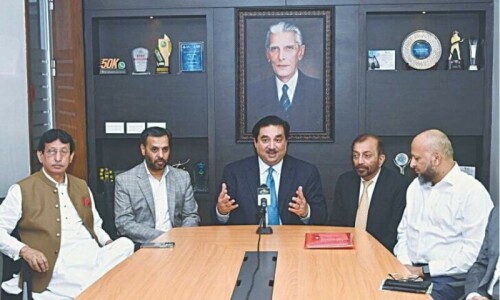ISLAMABAD: The federal government has decided to impose a Rs1.52 per unit surcharge on all electricity consumers of K-Electric to mop up about Rs25 billion in additional revenue during the current fiscal year.
This will be on top of an average Rs30 per unit uniform national base tariff, Rs3.23 per unit financing cost surcharge and various taxes and duties besides the quarterly tariff adjustments and fuel cost adjustments that keep on changing on a quarterly and monthly basis.
The Power Division has asked the National Electric Power Regulatory Authority (Nepra) to meet the formality of convening a public hearing on the subject as required under the law before issuing a notification. Nepra has called a public hearing on Aug 15 to rubber-stamp the request.
The new surcharge would apply to all consumers irrespective of any consumption limit or consumer category and sector. This also means the surcharge would be payable by life consumers using less than 50 units per month as well. The surcharge has been necessitated because of over 15 months (between July 2019 and September 2020) of stay orders secured by the KE against its Multi-Year Tariff (MYT) approved by the regulator in July 2018. During that period, the consumers of other distribution companies had been paying higher rates approved by the regulator.
Nepra sets public hearing for Aug 15 to rubber-stamp govt’s decision
However, the irony of the matter is that many new consumers who may not have lived in the country’s largest port city three years ago would have to bear the burden of some other consumers of the said period who may have moved out by now. In one of the ECC meetings, some members had reportedly raised this issue but had to surrender to meet subsidy targets committed to the International Monetary Fund (IMF).
In its request to Nepra, the Power Division recalled that it had determined the KE’s multi-year tariff on July 5, 2018 which was duly notified by the Federal Government on May 22, 2019 and modified from time to time to maintain uniform tariff in the country. However, “during the period from July 2019 to September 2020, the consumer tariff of KE was not increased uniformly as compared to ex-DISCOs due to pending decisions at various forums. Due to this pendency, the impact of such adjustment was not passed on to the consumers of K-Electric resulting in an impact of Rs24.5bn”, the Power Division said.
To justify the surcharge, the power division argued that section 31, sub-section (8) of the Nepra Act provided that “in addition to the tariff, rates and charges notified under sub-section (7) and this sub-section, each electric power supplier shall collect such surcharges from any or all categories of consumers, as the federal government may charge and notify in the official Gazette from time to time, in respect of each unit of electric power sold to any or all categories of consumers”.
Moreover, the amount of such surcharges shall be deemed as a cost incurred by the electric power supplier and included in the tariff notified provided that such surcharges shall be levied for funding of any public sector project and fulfilment of any financial obligation of the federal government for electric power services.
Also, under the National Electricity Policy 202l, the government has the powers to maintain a uniform consumer-end tariff for K-Electric and state-owned distribution companies (even after privatisation) through the incorporation of direct or indirect subsidies.
Published in Dawn, August 4th, 2023














































Dear visitor, the comments section is undergoing an overhaul and will return soon.